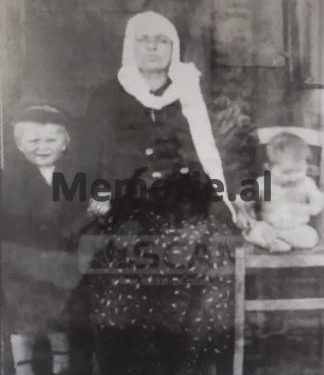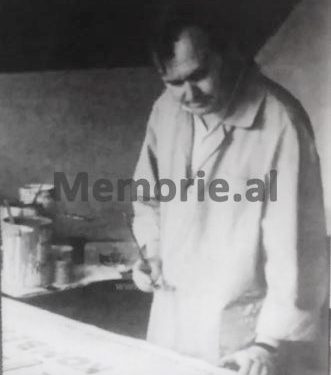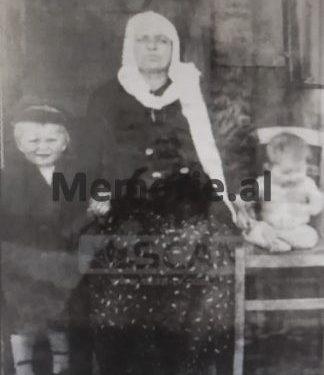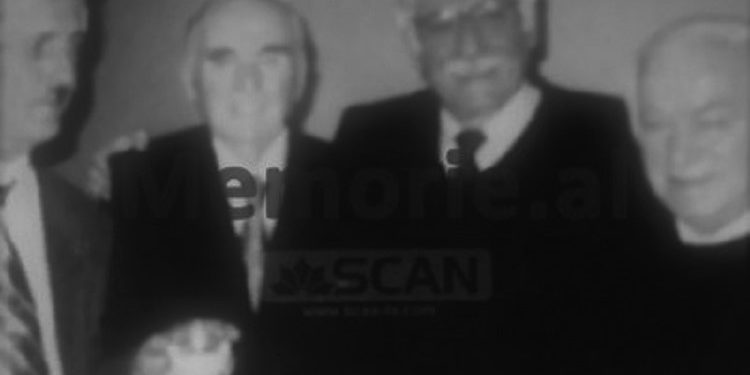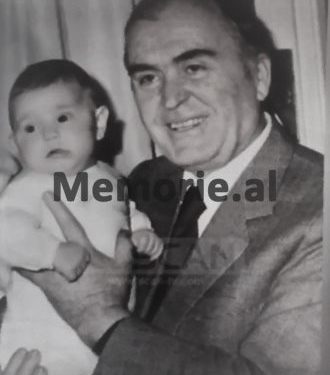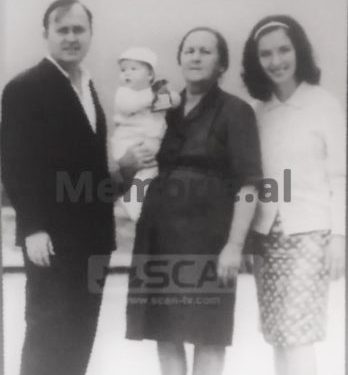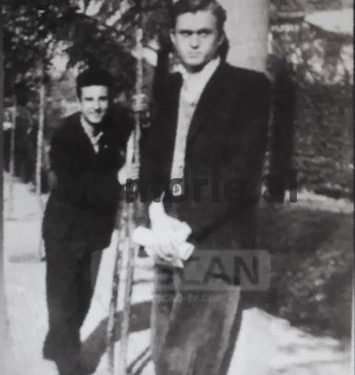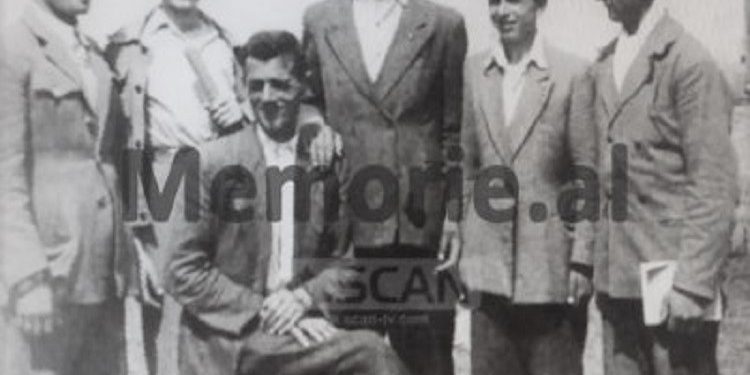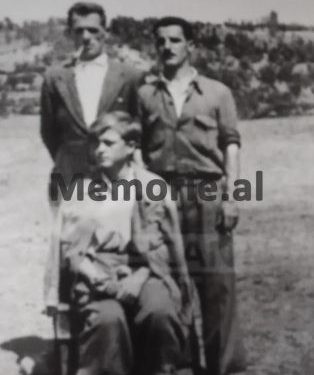Dashnor Kaloçi
Memorie.al publishes the unknown story of Xhemal Ferra, originally from the city of Kruja, who at the age of eight sold whistleblowers to the Austro-Hungarian garrison soldiers of that city and became one of the traders during the period of the Zog Monarchy. and well-known builders not only in the Kruja and Mati districts, wherewith state funds he built several public buildings, such as the Burrel Military Sub-Prefecture and Garrison, and electrified the city with a plant he brought from London, but also to Tirana, where he won the right to build the Royal Zog (Palace of Brigades), which was not completed because in May 1939 Jemal was exiled to Italy as an anti-fascist. The testimony of his son, Ferik Ferra, about his father’s history from the time he was interned in Italy and later throughout the communist regime, where he as one of the most prominent businessmen in the city of Milan for the textile and construction trade. , assisted the Albanian government in finding markets for the sale of various products exported by Albania at that time. Why did he refuse to return to Albania after the communist regime allowed family members to visit him in Italy, and parted ways in June 1991, moving to the last residence in Tirana, where he was last in 1943 ?!
It was the end of June 1991, when the lifeless body of Xhemal Ferra, originally from Kruja, who had left his hometown since leaving Rinas airport with one of the few airlines affecting Albania at that time, arrived. 1943. Who was this man who was otherwise known as “Count Ferra”, and what was his past that made him known to all Albanians? For the first time the Count’s eldest son, Ferrik Ferra, the famous poet who, after the 90s, began to follow in his father’s footsteps, tells Memorie.al, his father’s unknown 90-year history. Xhemalit: since leaving Mulla Hussein’s elementary classes in Kruja to sell skirmishes to Austro-Hungarian soldiers, until he closed his eyes at one of the Polytechnic University of Milan medical clinics in Italy on June 21, 1991.
How did the trade begin?
Xhemal was born in the city of Kruja in 1903, and was the third child of Haji Ferra, the krutan who had completed ten years of military service in the Turkish Empire, going as a dummy for his brothers. After returning from the army, Haxhiu began to do small business, which he did mainly in Mati district. After the death of the eldest son, who assisted Hajj in the trade, the family’s economic situation deteriorated and he was forced to drop out of school, the other son, Jemal, who studied with Mulla Hussain (the school of the wealthy in the city). , to find a job. Initially he started working with his nieces (Tribe Vogli), as a migrant, who, seeing his skills in the trade, then opened a shop and made a partner. After the Austro-Hungarian troops entered the town of Kruja, he began to go from their barracks, where he sold everything to the soldiers. Jamal had a very good natural memory, he thought of all his actions when buying and selling. This helped him to learn the German language in a few months, with which he could communicate freely with the Austro-Hungarian soldiers. The Austrian commander of the Kruja garrison, seeing his abilities and inclinations, proposed to father Hajj to send Jemal to study at a military school in Austria, and to show him a handsome military uniform. This was not accomplished after his mother refused him, given the ten-year-long wait she had made to her husband. After that, the Austrian commander sent Xhemali as a translator to the administration of the Cudhin municipality near Kruja. In 1932, Jamal married a girl from the well-known tribe of Kruja Dolls, with whom he had three sons and a daughter.
From London, a powerhouse for Burrel
The construction activity made them very popular and subsequently won as a construction firm the tender for the erection of the Burrel City Sub-prefecture building and the Military Garrison. Following these constructions that were evaluated by the Ministry of World Affairs, in 1932-’33, Xhemali opened a passenger transport company, putting his buses on the line: Tirana-Burrel and vice versa which helped many travelers to travel to the capital… Xhemali’s activity and profits began to increase, and he continued building activity in the town of Burrel, setting up warehouses, and a hotel with a restaurant for himself. After several years of working in the city of Burrel where most of the commercial and construction activity was, Xhemal Ferra thought to set up a power plant for the city of Burrel. He and his fellow residents succeeded in doing so by purchasing a power plant in the British capital, London, which he brought and installed in the city of Burrel, making electric lamps for the first time light up in that city… In 1935, the Ministry of World Affairs, seeing its successful construction activity, offered him the tender for the erection of the Royal Palace (today the Palace of Brigades), which he began to build. Xhemal Ferra had a very extended time activity, which involved approximately 50 employees. Employed as an economist at the firm of Xhemal Ferra, for several years under the monarchy, Hysni Kapo, one of the people after 1945, worked as the leading figure of the Albanian communist state after Enver Hoxha. Concerning his activity as a trader and builder, his son Ferrik testifies: “During the monarchy, my father, Xhemali, had 12 trucks, buses, and other unloading vehicles. In addition to the shops he had in the cities, where his trade and construction activity was extended, he built four houses for himself in Burrel, Durres, Kruja, and Tirana. (House in Burrel, served as Reception House, until 1990) A great help in his commercial activity was given to Jemal and his brother, Qazim. In addition to his trading skills, Jamal was a great worker. Breakfast was in Kruja, lunch in Burrel, dinners in Tirana and tomorrow in Durres. All this he did along with his personal driver, Njazi Islam (after 1945 he was Minister of Communications and a member of the Central Committee of the APL), a well-behaved and hard-working boy. His father valued and loved Nazi, who he often replaced at the wheel, Ferrik recalls,
Internment in Italy
In 1939, the largest construction activity of Xhemal Ferra was focused on the construction of the large Royal Palace that had been started by King Zog and raised with state funding. He continued this work until May of that year when he was arrested by the Italians, and all that colossal construction would remain incomplete, only for refinement. The arrest of Xhemali on charges of a political opponent of fascism came shortly after the occupation of the country after he had aided and abetted free food, about 1,000 volunteers for 8 days in the Qafe-Shtamë of Kruja, where they had ambushed the forces. invading Italians, advancing deeper into the country to get to Mat. So on May 24, 1939, Xhemali was arrested and put on trial on June 12, along with his brother Qazimi, who was sentenced to two years’ internment in Italy. In the act of their punishment, by court order, all the property was seized along with bank deposits (substantial sums), all commercial and construction activity was closed. Their family left only the house that Xhemali’s father, Haxhi Ferra, had erected in Kruja. After the verdict, Xhemali and Qazimi were taken to Bari prison and were then separated, on their way, to Xhemali in Kolflorito and Qazimi to Aquila. In the prison camp of Colflorio where Xhemali was held, interned as political opponents of the fascist regime and many well-known Albanian intellectuals, such as professors: Zijaudin Kodra and Petraq Pepo, Tahir Dizdari, Faik Bregu, Tefik Gjyli, Skender Frashëri, Haki Luzati, Seit Bilali, etc. Regarding this Ferrik Ferra recalls his father’s words: “Therein Kolflorito in the early days of internment, I remembered that I had left school without doing all the time I had available, and spent it among renowned intellectuals, such as professors Zijaudin Kodra and Petraq Pepo, who were discussing and debating in the camp where many of the Albanian intelligence at that time was located, which I listened to carefully. ” Even in that prison, Xhemal did not forget his craft, dealing with the supply of convicts with food. After two years of exile, Xhemali, along with his brother Qazimi, was released and returned to Albania. Xhemal settled in Kruja near his father’s house and started n again a small trade in a barrack that had once been for the sale of Burrel-Tirana bus tickets, which was the only “asset” left without being seized. Brother Qazimi, however, settled in Tirana, where he opened a shop as a co-shop with Rexhep Kasmin from Kruja. Jemal continued this work until March 1943. So on April 23, 1943, he left with great pain to never see his country alive again.
In 1943, you settled in Milan
Jemal settled in the city of Milan, hoping to start some small activity. Regarding this time period of Xhemal Ferra, his son Ferrik testifies: “At first the father appeared at the Quester every day and the space for the movement was limited. He contacted merchants coming from Albania to buy various goods and introduced them to the owners of the host companies. For the work the commissioner did, he received a small percentage of the profits from the two merchants he presented. After some time, he raised this figure to 2%, which enabled him to create a profit and sufficient funds to enter into a small textile trade that he knew very well. He bought from a textile firm and sold them to another firm. He continued this work until the end of 1944 when he came fully into the textile business. During the time he was involved in textiles, he smelled the lack of cotton that his business lacked, which was beginning to be felt by the War years. After the end of the War in November 1944 and the overthrow of the Communist regime, Xhemali never returned to Albania, where all the people of the family were. He was attentive to political conjuncture and said: ‘The national liberator is far from what he promised during the war.’ from his place. One of the reasons that worried him most and influenced his decision to stay in Italy was the arrest and conviction of his brother Qazimi in 1946, as well as the seizure and confiscation of all his property by the communist regime. in power. (The government that came in October 1943 restored to him all the wealth the Italians had seized.) Under these conditions, in mid-1945, when Italy began to be liberated from the War and its aftermath, the state began to consolidate. democratically legal, Xhemali thought to stay there and began to take an interest in the cotton markets which offered colossal jobs and profits, ”recalls Ferrik Ferra when his father, Xhemali, decided to stay in Italy.
In Tehran for trade
Concerning Jemali’s departure to distant Iran for the problem of finding cotton markets, his son, Ferrik, testifies: “After studying the cotton market conjunctions well, his father went to Tehran in mid-1946, and contacted the owner of one of the largest cotton firms in the world. Before signing the contract, Jamal told the Persian merchant: ‘Sir, how many meters of textile do you want to bring from Italy?’ He was taken aback and addressed his father: ‘Lord Ferra, I am a cotton merchant, not a textile merchant.’ After that, Jamal turned to you and said: ‘Do you have a bad sir to win on both sides?’ Attracted by his father’s suggestion, the Persian merchant began to think seriously about it and found that his profit was indeed great in two ways. So he, on the one hand, was selling large quantities of cotton, and on the other hand getting ready-made textiles from Italy, which Xhemal would bring to his market in Iran. ” He added to the cotton trade, which he bought from the Persian merchant and sold to Italy. His work is particularly notable for the great work he did with the American firm Anderson-Clayton, which was then one of the largest cotton houses in the world. Never breaking off contact with his family, which he helped financially for some legal reasons, Xhemali continued to help other friends and relatives he once worked within Albania.
It saved 4,000 Italian workers from bankruptcy
In 1955, one of the textile factories with which Xhemal traded was on the verge of bankruptcy. Ferrik tells: “The factory owners, having no other choice, asked his father to help him financially in order to overcome the crisis that would lead him to bankruptcy. Jamaal helped them by giving you a large sum without interest. After the factory went through the crisis, the president of the Italian trade unions of that time, De Vitorio, cordially thanked him for his jest, saying he had rescued some 4,000 workers from the street shooting. He also addressed his father, telling him that he knew he did not have a family in Italy, and if he wished he could intervene with the highest Albanian authorities to allow him to reunite with his family in Italy. The father, after thanking him for his interest, said no, but left it to him. De Vitorio’s response from the highest Albanian authority was: “We haven’t done the law yet, but once we do, we’ll see what can be done”.
It opened the markets for Albania with the West
Towards the end of the 1950s and early 1960s, Xhemal’s cotton trade began to decline, due to high competition, and profits fell sharply. So he was forced to move his business into construction, because in those years Italy was in an economic boom phase, and as a good connoisseur of business conjunctions, he knew how to maneuver and find opportunities to work. In 1959, two Albanians, who were trade representatives at the Albanian Embassy in Rome, went to his work office and asked to talk to him about trade problems. Xhemali testified about this visit: “I very coldly welcomed those two officials of the Albanian embassy, because I knew that one day they would come to my office to ask for help. After talking normally about trade affairs, the problem was overcome somewhat when one of them asked me about the wheat price conjunctions in Italy, and the ways they could buy. I told you that wheat in Italy was reasonably priced, but I was amazed at the fact that the Soviet Union, which has enough wheat to cover the entire territory of Albania, why not give it to you, are you looking to buy it here? However, and after these words, Xhemal appeared ready to assist them in all requests for goods that they wanted to buy for Albania. Seeing Albania’s small opportunities for trade with Italy, Dad began thinking of opening a trade office in Milan with Albanian representatives, who would coordinate bilateral trade in goods between the two countries, especially in some raw materials. that Albania had to some extent. Thus, after the opening of this office, from Albania to Italy and the West, large quantities of goods began to flow, such as tobacco, cotton, bitumen, marble, oil, artistic products, etc. The father in assisting Albania in opening up its markets to the West did not put between his political views and his anger at the seizure of brother Qazim’s wealth and imprisonment, and that his family in Albania was differentiated and viewed. with a negative sense. He did it without any interest, but simply as an Albanian who loved his country and the Albanians. ”
It opens the way to meeting the family
The great help that Xhemali gave to the Albanian state put the official authorities of Tirana in a great position in dealing with the Ferra family in Albania. In 1962, the Albanian state allowed Xhemali’s eldest son, Ferik, to meet his father in Italy, whom he had not seen since April 1943. Concerning this visit, Ferik recalls: “I spent about three months with my father in Milan, in his only apartment. He lived a normal life until he died, without any luxury. He had great opportunities to build villas for himself, but stayed in that simple apartment and his work office. He had a brilliant memory and a strong mind that did mathematical operations with a few digits. Dad kept Albanian traditions and every time he talked about Albania, his eyes filled with tears. He was very angry about the situation in Albania, and regretted that some trade representatives at the embassy in Rome, whom he had helped and gained experience as soon as they returned to Albania, ended up in prisons. The opening of the commercial office in Milan which he willingly made, and all the assistance he rendered not only in the commercial sector but also in the credit which came as a guarantor for the Albanian party, gave him great pleasure in doing something for him. his place. His father found it difficult to return to Albania permanently with his family, although he had all the opportunities and open paths. The main reason was that he had deep political differences with the regime in power that did not promise him any prospects. His coming here would only create serious problems for himself and his family. Although he never changed his Albanian citizenship to obtain Italian, throughout his life in Italy and until he died, he remained merely an Albanian economic emigrant. ” After the boy’s first visit to Feriku, the state gradually allowed other members of the family to visit him once in Italy. Jamal continued to help his family in Albania and insisted that they finish the schools he was ready to provide.
Official offer form Tirana: Mr. Ferra, bring the deposits here
In the 1960s, Xhemal Ferra was considered and recognized in Italy as one of the successful businessmen. That same year, when an Italian government delegation paid a several-day visit to the Soviet Union, it was invited and designated to be a businessman, Xhemal Ferra. The reasons are not known yet because in the final moments of that delegation’s departure, Jamal did not appear. After finding out about it, they learned that he was hospitalized at one of Milan’s medical clinics ?! From the beginning of the 1970s, during a conversation that Xhemali was having with some representatives of the Ministry of Foreign Trade of Albania, who had gone to Italy for work problems, they asked him to suggest if he wanted to see the possibility of transferring bank deposits from Italian banks to Albania, guaranteeing the respective interests. Regarding the offer made by the Albanian official to Xhemal Ferra, his son Ferrik testifies: “After listening to them, the father responded with diplomacy, saying: ‘I will consider this proposal and will see it after I have completed some work I have in my hands.
The end of a long life
Although Xhemal Ferra is known in Albania as Count Ferra, he never had and never wished to call it that. Concerning this, his son Ferrik testifies: “The father has never allowed anyone to call him Count Ferra. When someone called him that, understandably sympathetic, he explained that he had never had that title. The titles: Count, Baron, Marquez, etc., were given only in the Monarchical regimes, and Italy where he lived and worked as a republic. Although he did not accept the title of Cont, he had a particular fondness for the period of the Bird Monarchy. To this he explained: “I have tried all regimes from Austro-Hungary to fascism. But the Monarchy period was the best because it gave us the opportunity with the legislation created to work all together and showcase our skills. ” Jamal worked actively with his business until 1977-’78 without interrupting for a moment. Even after this age, when he quit his business, he pursued Italian and European scholarship, not for any economic gain but only for professional dissatisfaction. And at a young age, he was a regular stockbroker, giving advice to many of his business and business friends who asked him about everything. The hard work that started him at age 8 and leaving him at the age of 78, occasional illnesses and surgical interventions, had done its job. By the late 1980s, he realized that the moment was coming to a close, but he was unwilling and proud of what he had done in his life’s work and life. Concerning the last days of nearly 90 years of Xhemal Ferra’s long life, his son Ferriku recalls: “In February 1991, a few months before his father passed away, he saw on the television the demolition of Enver Hoxha’s monument . After a little thought, he told the people close to him: Now difficult days will begin for Albania. He was eager to come and enjoy these “difficult days”, but his ill health did not promise. In June 1991, in the final days of his life, we accidentally found him in the clothes he was wearing, a small Albanian flag he had carried with him since 1939 when he was interned as an anti-fascist in Kolflorito, Italy. He explained to the people who asked him to carry him with him as a sign of identity, because his path and work went through dangers that did not know the end. ” Despite great efforts by physicians at the Polytechnic University of Milan clinic to keep that 88-year-old body alive on June 21, 1991, at a time when Albanians were experiencing the end of the nearly 50-year-old communist system, Xhemal Ferra passed away. . His relatives brought his body to Albania and friends of his relatives made a dignified escort with all honors to the last residence in Tirana. Memorie.al




